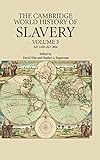The Cambridge world history of slavery / edited by Keith Bradley and Paul Cartledge.
Publisher: Cambridge ; New York : Cambridge University Press, 2011-2021Description: volumes : 3 illustrations, maps ; 24 cmContent type:- text
- unmediated
- volume
- 9780521840682
- 306.36 ELT-III
| Item type | Current library | Shelving location | Call number | Status | Barcode | |
|---|---|---|---|---|---|---|
 BOOKs
BOOKs
|
National Law School | General Stacks | 306.36 ELT-III (Browse shelf(Opens below)) | Available | 27712 |
Includes bibliographical references and indexes.
V. 1. The ancient Mediterranean world / edited by Keith Bradley and Paul Cartledge -- v. 2. AD 500-AD 1420 / edited by Craig Perry, David Eltis, Stanley L. Engerman, and David Richardson -- v. 3. AD 1420-AD 1804 / edited by David Eltis and Stanley L. Engerman -- v. 4. AD 1804-AD 2016 / edited by David Eltis, Stanley L. Engerman, Seymour Drescher, and David Richardson.
"Most societies in the past have had slaves, and almost all peoples have at some time in their pasts been both slaves as well as owners of slaves. Recent decades have seen a significant increase in our understanding of the historical role played by slavery and wide interest across a range of academic disciplines in the evolution of the institution. Exciting and innovative research methodologies have been developed, and numerous fruitful debates generated. Further, the study of slavery has come to provide strong connections between academic research and the wider public interest at a time when such links have in general been weak. The CambridgeWorld History of Slavery responds to these trends by providing for the first time, in four volumes, a comprehensive global history of this widespread phenomenon from the ancient world to the present day. Volume I surveys the history of slavery in the ancient Mediterranean world. Although chapters are devoted to the ancient Near East and the Jews, its principal concern is with the societies of ancient Greece and Rome. These are often considered as the first examples in world history of genuine slave societies because of the widespread prevalence of chattel slavery, which is argued to have been a cultural manifestation of the ubiquitous violence in societies typified by incessant warfare"--Provided by publisher.
There are no comments on this title.
